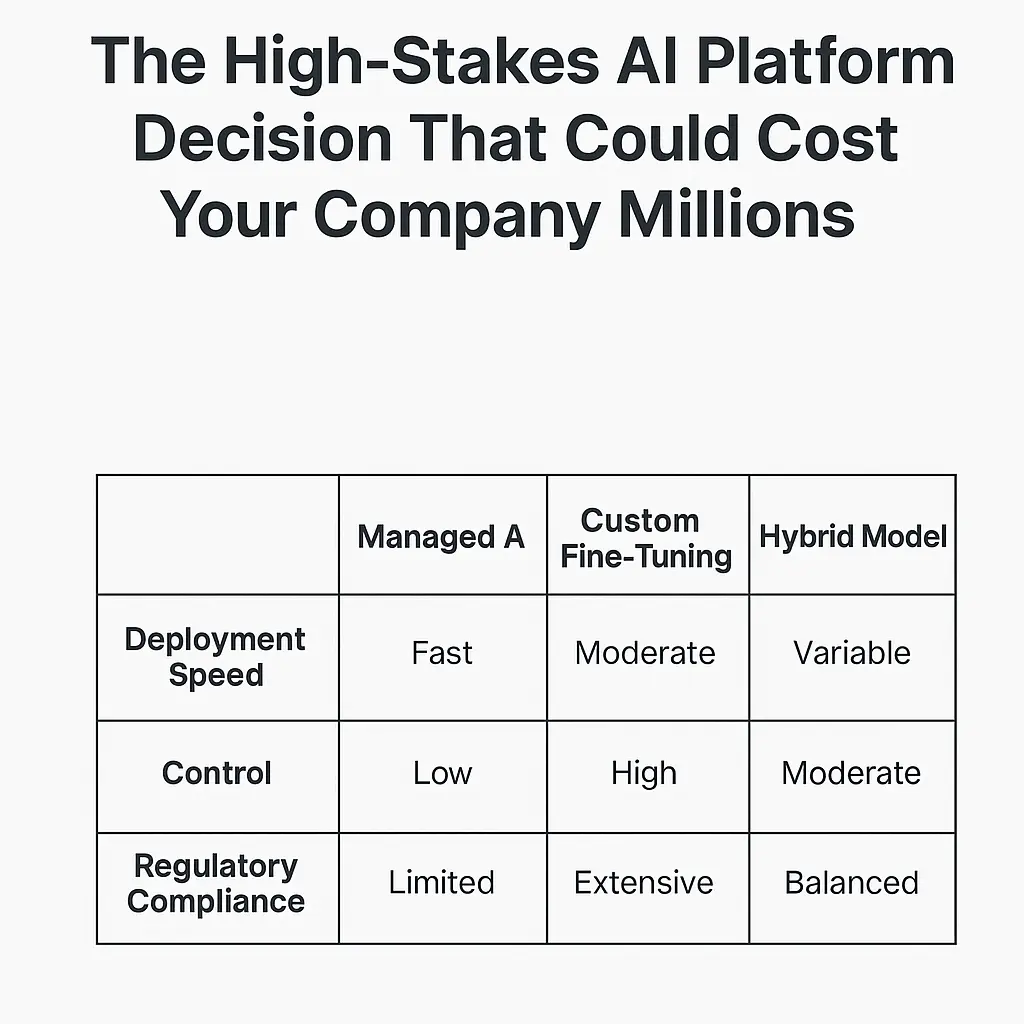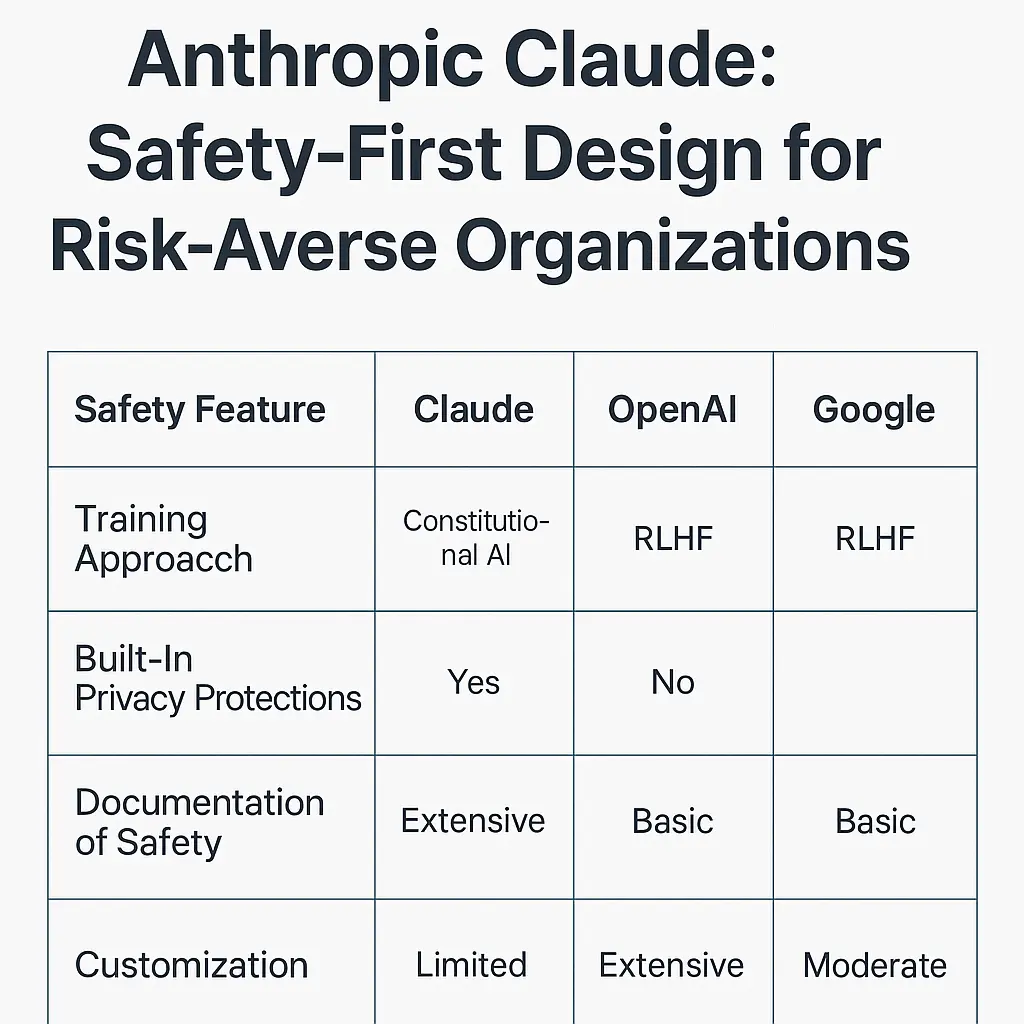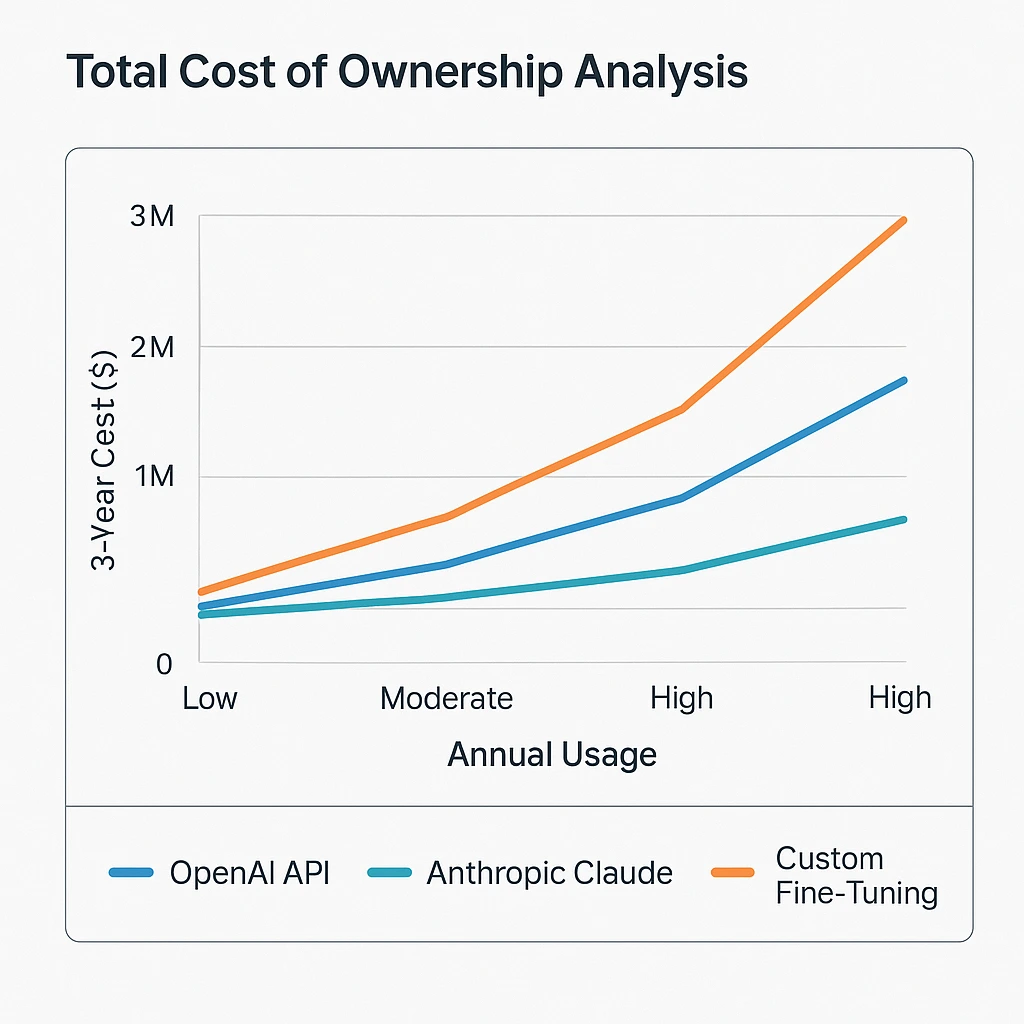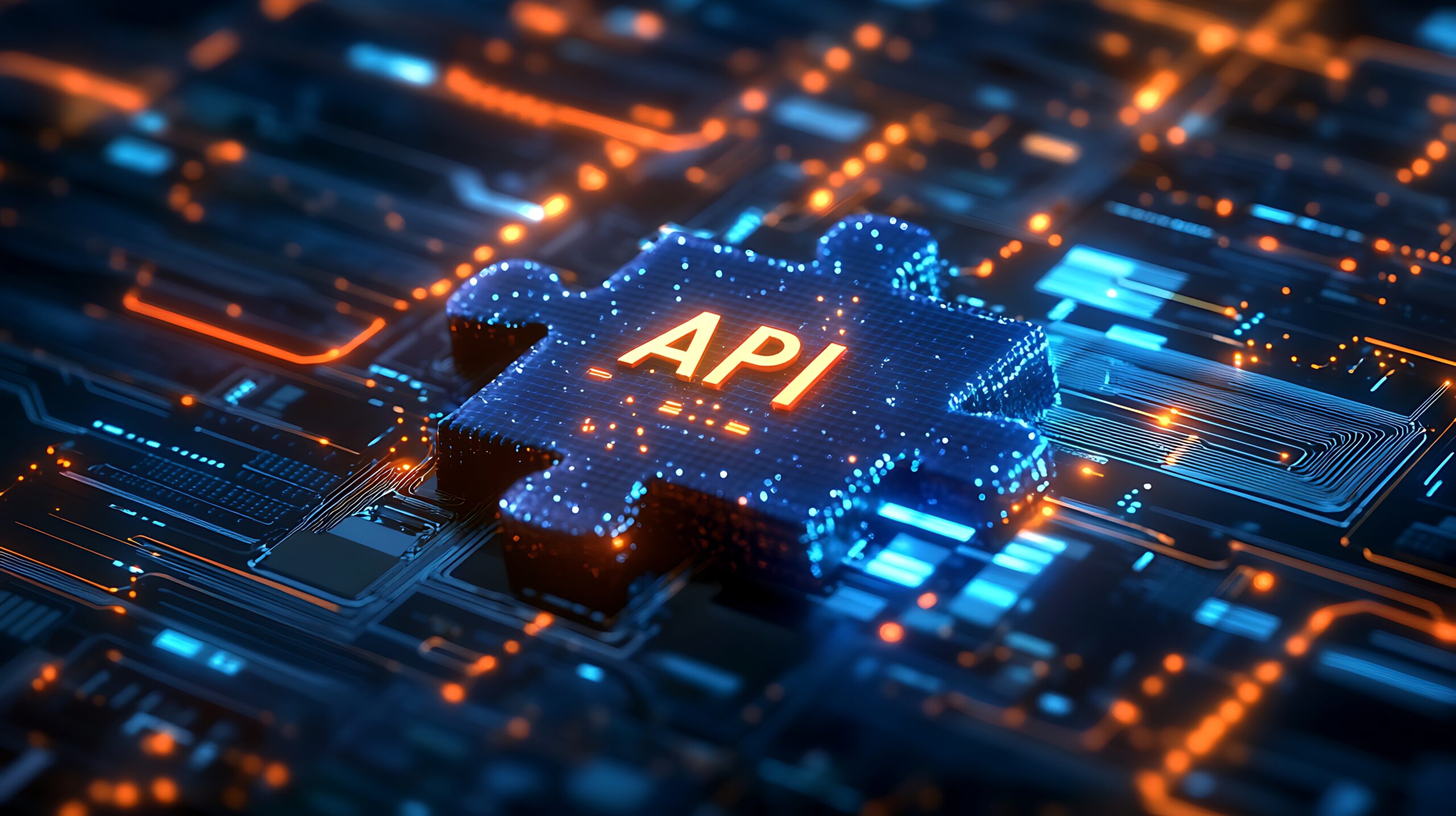The High-Stakes AI Platform Decision That Could Cost Your Company Millions
Selecting the wrong AI platform in regulated industries isn’t just a technical misstep—it’s a compliance catastrophe waiting to happen. 97% of companies accelerated their digital transformation initiatives since 2020, yet most enterprise leaders still fumble when balancing innovation with regulatory requirements.
Financial services, healthcare, and government organizations face a make-or-break decision: deploy managed AI APIs for speed, or invest in custom fine-tuning for control. With AI regulation frameworks like the EU AI Act demanding algorithmic transparency and audit capabilities, your platform choice today determines your compliance fate tomorrow.
I’ve analyzed the three dominant approaches to enterprise AI deployment, creating a decision framework that’ll help you avoid costly missteps while meeting your industry’s regulatory demands. (Because nobody wants to explain a compliance violation to the board.)

Fig.1 Comparative overview of all three approaches with key differentiators
Quick Decision Guide: Which Platform Fits Your Compliance Needs?
OpenAI API offers comprehensive NLP capabilities with Azure compliance integration—solid for most enterprise use cases but limited for highly regulated environments requiring full data sovereignty.
Anthropic Claude prioritizes safety through Constitutional AI design, making it ideal for risk-sensitive applications, though customization options remain restricted.
Custom fine-tuning delivers complete control over data and algorithms—essential for heavily regulated sectors. Custom solutions often require minimum investments of $100,000 annually but provide the regulatory transparency that managed APIs simply can’t match.
OpenAI API: Enterprise-Ready with Compliance Compromises
What Makes OpenAI API Attractive for Enterprise
OpenAI‘s API delivers industry-leading natural language processing across more than 50 languages with 99.9% uptime guarantees. The platform’s GPT-4 and GPT-3.5 models handle most business applications effectively, while fine-tuning features allow customization using your proprietary datasets.
The real compliance story emerges through Azure OpenAI Service integration. This partnership provides SOC 2 Type II certification and ISO 27001 compliance, meeting baseline enterprise security standards. More importantly for regulated industries, Azure integration offers HIPAA, FedRAMP, and regional data residency options that standard OpenAI API lacks.
Where OpenAI Falls Short for Regulated Industries
However, significant gaps remain for heavily regulated sectors. The standard API lacks comprehensive audit logging capabilities required for financial services compliance. Model training data transparency stays limited, creating challenges for industries requiring algorithmic explainability.
Data processing occurs primarily in US-based infrastructure, potentially conflicting with strict data sovereignty requirements in European or Asian markets. OpenAI Azure supports regional data processing but with limited geographic options compared to fully on-premises solutions.
Anthropic Claude: Safety-First Design for Risk-Averse Organizations
Constitutional AI Reduces Compliance Risks
Claude’s Constitutional AI training methodology sets it apart by prioritizing safety and reducing harmful outputs. Anthropic’s Constitutional AI approach demonstrates significant improvements in avoiding biased, toxic, or inappropriate responses—crucial for risk-sensitive applications in financial advisory or healthcare settings where inappropriate outputs could trigger regulatory scrutiny.
The technical architecture offers compelling enterprise features. Claude supports context windows up to 400,000 tokens, enabling comprehensive document analysis for regulatory review. JSON mode and function calling capabilities facilitate integration with existing enterprise workflows.
Compliance Features and Limitations
From a compliance perspective, Anthropic provides detailed documentation of safety approaches and methodology, supporting some algorithmic transparency requirements. Built-in privacy protection features minimize retention of sensitive information, addressing key regulatory concerns about data handling.
The primary limitation lies in customization restrictions. Limited fine-tuning options may restrict adaptation needed for industry-specific compliance workflows. While Claude excels at general safety, organizations requiring specialized regulatory tasks like anti-money laundering detection may find customization options insufficient.

Fig.2 Safety features across all three platforms
Custom Fine-Tuning: Maximum Control for Stringent Regulatory Requirements
Complete Ownership Enables Full Compliance
Custom fine-tuning delivers complete control over training data, model architecture, and deployment infrastructure—essential for organizations with stringent regulatory requirements. This approach enables implementation of industry-specific compliance features including custom audit logging and data handling protocols.
The technical advantages are substantial:
- Full data sovereignty through on-premises deployment
- Complete algorithmic transparency with access to model weights and training processes
- Custom audit logging tailored to specific regulatory frameworks
- Direct integration with existing compliance monitoring systems
Investment Requirements and Resource Demands
The resource requirements are significant. Custom fine-tuning demands substantial ML expertise, with typical implementation timelines ranging from 6-18 months. Infrastructure and development costs often range from $100,000 to $1 million annually depending on project scale, data complexity, and compliance requirements.
Organizations need dedicated technical teams for:
- Initial model development and training
- Ongoing model maintenance and updates
- Security monitoring and compliance validation
- Performance optimization and scaling
Compliance Feature Analysis: What Actually Matters for Regulated Industries
Data Residency and Sovereignty Requirements
Data residency requirements vary dramatically across platforms. OpenAI Azure integration supports regional data processing but with limited geographic options. Anthropic Claude processes data with some privacy controls but primarily in US infrastructure with expanding regional availability.
Custom fine-tuning provides complete control over data location and processing jurisdiction—often a mandatory requirement for European GDPR compliance or Asian data protection laws.
Audit and Monitoring Capabilities
This is where the differences become stark:
- OpenAI offers basic usage logging through Azure integration but lacks comprehensive audit trails required for SOX or Basel III compliance
- Anthropic Claude supports some logging and privacy features, but regulatory-grade audit trails may require additional enterprise infrastructure
- Custom solutions enable comprehensive audit logging tailored to specific regulatory frameworks with full request-level tracking
Model Transparency and Explainability
Model transparency represents perhaps the most critical differentiator. OpenAI provides transparency documentation but limited insight into model decision-making processes, challenging explainability requirements in financial services or healthcare.
Anthropic documents its safety approaches and methodology more extensively than most providers. Custom models enable full explainability features including attention visualization and decision pathway analysis—essential for regulatory accountability.
Ready to make your AI platform choice compliance-proof and future-ready?
Partner with SmartDev’s enterprise AI experts to evaluate, design, and deploy platforms that align innovation with global regulatory standards.
Reduce compliance risk, ensure data transparency, and scale securely with SmartDev’s AI-powered delivery frameworks tailored for regulated industries.
Start My AI Compliance StrategyIndustry-Specific Implementation Strategies
Financial Services: Balancing Innovation with Strict Compliance
Financial institutions face unique challenges requiring different approaches based on specific use cases:
- Real-time fraud detection demanding sub-millisecond latency typically requires custom fine-tuning for optimal performance
- Customer service and document processing can leverage OpenAI Azure integration which meets most banking compliance requirements
- Wealth management and advisory services benefit from Claude’s safety-first approach where inappropriate responses could trigger regulatory scrutiny
Healthcare and Life Sciences: HIPAA Compliance Above All
Healthcare organizations must prioritize HIPAA compliance above other considerations. This typically favors Azure OpenAI Service or custom fine-tuning over standard API implementations.
Clinical documentation workflows benefit from custom models trained on medical terminology and regulatory language, automating protocol drafting and regulatory document generation while maintaining compliance with standards like GVP.
Government and Public Sector: Maximum Security Requirements
AI adoption in government and public sector organizations requires specialized deployment approaches that address regulatory constraints absent in commercial applications. Public sector compliance standards typically mandate three critical capabilities:
- Data sovereignty requirements typically mandate custom fine-tuning or Azure Government Cloud deployment
- Security clearance requirements may necessitate air-gapped custom model deployment
- Transparency and explainability requirements favor custom solutions with full algorithmic documentation
Implementation Strategy: Starting Smart and Scaling Safely
Begin with Pilot Programs, Not Full Deployments
Smart organizations start with pilot programs rather than full-scale deployments. Industry surveys estimate only 35% of digital transformation initiatives achieve their intended outcomes; AI projects in regulated sectors face additional compliance hurdles.
Start with limited-scope pilots using managed APIs before committing to custom fine-tuning investments. Test compliance features against specific regulatory requirements using representative datasets. Evaluate vendor support responsiveness and compliance expertise during pilot phases.
Total Cost of Ownership Analysis
TCO analysis reveals significant differences across approaches:
- OpenAI API costs scale with usage but include minimal infrastructure overhead
- Anthropic Claude pricing remains competitive for safety-critical applications requiring fewer customizations
- Custom fine-tuning requires significant upfront investment but provides predictable long-term costs

Fig.3 3-year costs across different usage scales
Risk Mitigation Through Hybrid Approaches
Consider hybrid approaches combining multiple AI platforms for different use cases within the same organization:
- Establish clear data classification policies determining which AI platform handles different types of sensitive information
- Develop comprehensive AI governance frameworks including model performance monitoring and compliance validation procedures
- Plan for vendor diversification to avoid single-point-of-failure risks
Future-Proofing Your Enterprise AI Strategy
Preparing for Evolving Regulations
The regulatory landscape continues evolving rapidly. AI regulation frameworks will increasingly require algorithmic transparency and audit capabilities. Organizations should prioritize AI platforms with clear roadmaps supporting emerging compliance requirements.
Vendor lock-in risks can be mitigated through standardized API interfaces and data portability planning. Technology advancement considerations favor platforms with regular updates and backward compatibility guarantees.
Integration Ecosystem Maturity
Integration ecosystem maturity affects long-term platform viability and third-party tool availability. Model capability improvements happen rapidly in the AI space. Organizations need platforms that can incorporate new capabilities without disrupting existing compliance frameworks.
The choice between OpenAI API, Anthropic Claude, and custom fine-tuning ultimately depends on your organization’s specific regulatory requirements, risk tolerance, and technical capabilities. Each approach offers distinct advantages for different use cases and regulatory environments.
Making the Right Choice for Your Regulated Industry
For organizations beginning their AI journey in regulated industries, expert guidance helps navigate these complex decisions while ensuring compliance with industry-specific regulations. SmartDev’s AI consulting services provide the strategic framework needed to evaluate platforms against your specific regulatory requirements.
Our generative AI development services deliver the technical expertise needed to implement compliant AI solutions—whether through managed APIs or custom fine-tuning—that meet regulatory requirements while delivering measurable business value.
Ready to make the right AI platform choice for your regulated industry? Contact SmartDev to discuss your specific compliance requirements and explore how our AI expertise can accelerate your digital transformation while maintaining regulatory compliance.







